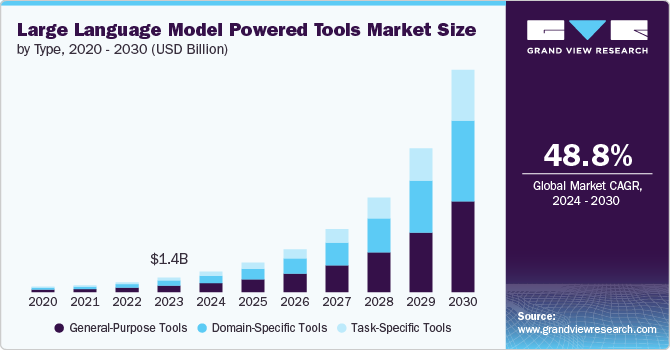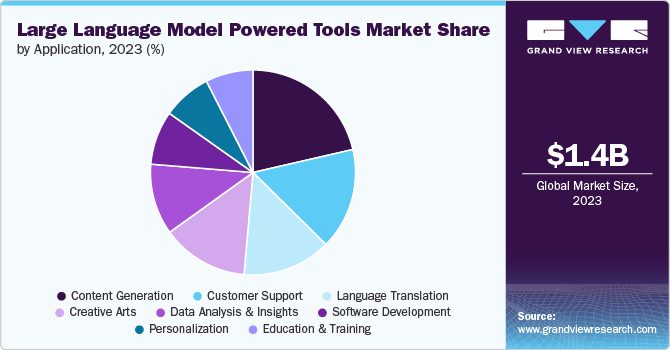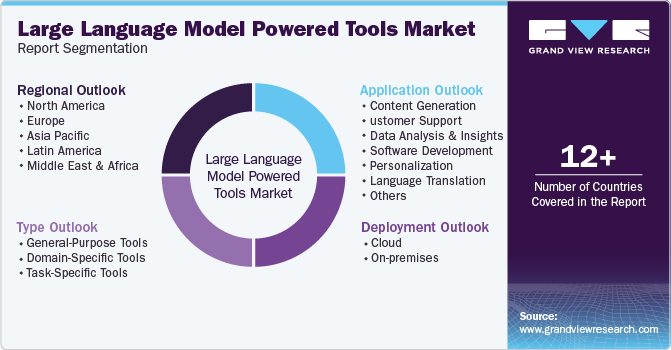
Large Language Model Powered Tools Market Size, Share & Trends Analysis Report By Type (General-purpose Tools, Domain-specific Tools), By Deployment, By Application, By Region, And Segment Forecasts, 2024 - 2030
- Report ID: GVR-4-68040-440-5
- Number of Report Pages: 150
- Format: PDF, Horizon Databook
- Historical Range: 2018 - 2022
- Forecast Period: 2024 - 2030
- Industry: Technology
Market Size & Trends
The global large language model powered tools market size was estimated at USD 1.43 billion in 2023 and is projected to grow at a CAGR of 48.8% from 2024 to 2030. The market for large language model (LLM) powered tools is expanding rapidly due to the increasing demand for advanced AI capabilities across various sectors. Businesses are utilizing these tools to automate tasks, enhance customer interactions, and improve decision-making processes. The integration of LLMs into everyday applications, such as chatbots, virtual assistants, and content generation platforms, is driving significant growth.

Companies are finding that LLMs can provide more accurate and contextually relevant responses compared to traditional rule-based systems. This rise in adoption is supported by the continuous advancements in model training techniques and computational power. As a result, the market is seeing a steady influx of innovative products and services. The increasing availability of LLM APIs and cloud-based solutions further accelerates this growth, making these tools more accessible to organizations of all sizes.
The consumer market for LLM-powered tools is also experiencing notable growth, with a diverse range of applications emerging. From personalized educational apps to creative writing aids and language translation services, LLMs are becoming a staple in many digital experiences. Startups and established tech giants are both investing heavily in developing new LLM-based solutions, driven by the technology’s versatility and effectiveness. Enhanced user experience, driven by more intuitive and engaging interactions, is a key factor behind this growth. Moreover, the ability of LLMs to adapt and learn from user inputs allows for increasingly personalized and dynamic applications. As more businesses and consumers recognize the benefits of LLM technology, demand continues to rise. This trend is expected to further fuel the expansion of the market and encourage continued innovation.
The growth trajectory of the LLM-powered tools market shows no signs of slowing down. Innovations in model architecture and efficiency are anticipated to drive further advancements and applications. Improved ethical frameworks and regulatory standards will help address concerns related to AI usage, making integration smoother and more secure. The convergence of LLM technology with other emerging fields, such as augmented reality and the Internet of Things, is set to open new avenues for growth. Enhanced capabilities and novel use cases will likely attract increased investment and interest from both the private and public sectors. As the technology matures, the market will continue to evolve, presenting new opportunities for developers and businesses alike. Overall, the future of LLM-powered tools looks promising, with sustained growth and innovation on the horizon.
Type Insights
The general-purpose tools segment led the market and accounted for 44.8% of the global revenue in 2023. These tools, such as versatile chatbots and content generators, offer broad functionality that can be easily adapted to different business needs, making them highly attractive to organizations of all sizes. Their ability to handle diverse tasks, from customer support to automated writing, provides significant value and flexibility, driving widespread adoption. Moreover, the scalability of general-purpose tools allows businesses to implement them without extensive customization, further fueling their market dominance. This segment's strong performance highlights the growing demand for adaptable and multifunctional AI solutions in the broader tech ecosystem.
The task-specific tools segment is experiencing notable growth within the LLM Powered Tools market due to the increasing demand for highly specialized solutions that address particular industry needs. These tools are designed to perform specific tasks with high accuracy and efficiency, making them invaluable in fields such as healthcare, finance, and legal services. As businesses recognize the benefits of tailored AI applications, such as improved productivity and more precise outcomes, the adoption of task-specific tools is accelerating. Furthermore, advancements in AI training and fine-tuning techniques are enabling the development of even more specialized models, catering to niche requirements.
Deployment Insights
The cloud segment accounted for the largest market revenue share in 2023 by offering unparalleled scalability and flexibility, making it the preferred choice for many organizations. Cloud-based tools enable businesses to deploy and manage LLMs without the need for significant upfront investment in infrastructure, reducing costs and operational complexity. The ability to easily update and scale models on the cloud has enabled rapid innovation and adaptation to changing market demands. Moreover, cloud platforms provide access to powerful computing resources and APIs, facilitating the integration of LLM capabilities into a wide range of applications. This accessibility and ease of use have driven widespread adoption, positioning the cloud segment at the forefront of the market.
The on-premises segment is predicted to foresee significant growth during the forecast period. The on-premises segment is experiencing growth as organizations with strict data security and compliance requirements increasingly turn to in-house LLM deployments. This growth is particularly evident in industries such as finance, healthcare, and government, where data sensitivity and regulatory constraints are paramount. On-premises solutions offer greater control over data and model customization, enabling businesses to tailor LLMs to their specific needs while ensuring compliance with internal policies. Advances in hardware and optimized software frameworks are making on-premises LLM deployments more viable and cost-effective.
Application Insights
The content generation segment accounted for the largest market revenue share in 2023. These tools enable companies to produce high-quality, human-like text quickly, reducing the time and resources required for content creation. The versatility of content generation tools, ranging from automated blog writing to social media posts, has made them indispensable across various industries. Their ability to maintain consistency and adapt to different tones and styles has further driven adoption. As demand for fresh and engaging content continues to rise, the content generation segment has solidified its leadership position in the market.

The personalization segment is projected to grow significantly over the forecast period. The personalization segment is rapidly growing as businesses increasingly seek to customize experiences to individual users. LLM-powered tools enable companies to deliver highly personalized content, recommendations, and interactions based on user behavior and preferences. This growth is fueled by the rising expectation for customized experiences, particularly in e-commerce, digital marketing, and customer service. Advanced personalization not only enhances user satisfaction but also drives engagement and conversion rates, making it a key focus for businesses. As AI technology continues to evolve, the ability to fine-tune personalization at scale is expanding, leading to broader adoption and deeper integration across various sectors.
Regional Insights
North America dominated the LLM powered tools market and accounted for 35.2% share in 2023. The LLM-powered tools market in North America is experiencing robust growth, driven by the region's strong technological infrastructure and high adoption rates of AI across various industries. The presence of major AI hubs, such as Silicon Valley, promotes innovation and collaboration, further propelling market expansion. Moreover, increasing demand for automation and advanced analytics in sectors such as finance, healthcare, and e-commerce is fueling growth. As a result, North America remains a key player in the global LLM market, setting trends that influence global adoption..
U.S. Large Language Model (LLM) Powered Tools Market Trends
In the U.S., the LLM-powered tools market is thriving due to the country's leadership in AI innovation and widespread adoption across multiple sectors. U.S. companies are utilizing LLMs to enhance everything from customer service to content creation, driving significant productivity gains. Government support and substantial investment in AI research contribute to the rapid development and commercialization of LLM technologies. The demand for advanced AI solutions in industries like healthcare, finance, and technology further accelerates market growth.
Europe Large Language Model (LLM) Powered Tools Market Trends
The LLM-powered tools market in Europe is growing steadily, driven by the increasing adoption of AI in industries such as manufacturing, finance, and public services. European companies are focusing on leveraging LLMs for specialized applications, including multilingual content generation and customer support. The region's strong regulatory environment and emphasis on data privacy encourage the development of secure and compliant AI solutions. Collaboration between European universities, research institutions, and businesses is fostering innovation in the LLM space.
Asia Pacific Large Language Model (LLM) Powered Tools Trends
Asia Pacific is anticipated to register the fastest CAGR over the forecast period. The Asia-Pacific region is witnessing rapid growth in the LLM-powered tools market, fueled by the increasing digital transformation across countries such as China, India, and Japan. Businesses in APAC are adopting LLMs to enhance customer experiences, automate operations, and drive innovation in sectors such as e-commerce and telecommunications. The region's large population and expanding internet connectivity create a vast market for AI-driven applications. Government initiatives and investments in AI infrastructure are also accelerating the adoption of LLM technologies.
Key Large Language Model Powered Tools Company Insights
Prominent firms have used product launches and developments, followed by expansions, mergers and acquisitions, contracts, agreements, partnerships, and collaborations as their primary business strategy to increase their market share. The companies have used various techniques to enhance market penetration and boost their position in the competitive industry. For instance, in March 2024, Microsoft introduced new tools through Azure AI for LLM-powered applications, including Prompt Shields, Groundedness Detection, and Safety Evaluations. These innovations are designed to help businesses mitigate security risks, ensure quality, and maintain user trust. They safeguard LLM-based AI applications from prompt injection attacks, identify hallucinations, and monitor risks throughout the AI lifecycle, providing a robust and scalable platform for responsible AI development on Azure.
Key Large Language Model Powered Tools Companies:
The following are the leading companies in the large language model powered tools market. These companies collectively hold the largest market share and dictate industry trends.
- OpenAI
- Google LLC (DeepMind)
- Microsoft
- Anthropic
- Cohere
- Hugging Face
- IBM Watson
- Jasper
- Stability AI
- Salesforce (Einstein)
- Grammarly
- Replika
Recent Developments
-
In June 2024, Anthropic launched the Tool Use feature for its AI assistant Claude, enabling users to build customized AI solutions by integrating with external APIs for tasks such as email management and online shopping. The Tool Use feature aims to enable custom AI solutions, support image analysis, and improve real-time responses and tool selection.
-
In May 2024, Sanofi, a French Pharmaceutical company, partnered with OpenAI and Formation Bio to develop AI-powered software to accelerate drug development. The software utilizes Sanofi's proprietary data, OpenAI's advanced AI capabilities, and Formation Bio's engineering resources. The collaboration between Sanofi, OpenAI, and Formation Bio aims to utilize advanced AI technologies to accelerate drug development, enhance research efficiency, and drive innovation in the pharmaceutical industry.
-
In May 2024, Anthropic officially launched Tool Use for Claude, moving it out of beta to offer sophisticated capabilities for integrating large language models with external data sources and APIs, enabling tasks like automation and data analysis. This feature enables Claude to intelligently select and utilize tools based on user prompts, enhancing functionality in applications such as personalized recommendations and complex workflows.
-
In January 2024, Google Cloud, a suite of cloud computing services offered by Google LLC, introduced a suite of new AI-powered tools for retailers, including advanced chatbots, improved product image generation, and enhanced search capabilities. These innovations aim to simplify chatbot deployment, enhance product descriptions, and provide more personalized shopping experiences, addressing both consumer dissatisfaction and growing interest in AI-driven retail solutions.
Large Language Model Powered Tools Market Report Scope
|
Report Attribute |
Details |
|
Market size value in 2024 |
USD 2.03 billion |
|
Revenue forecast in 2030 |
USD 22.07 billion |
|
Growth rate |
CAGR of 48.8% from 2024 to 2030 |
|
Base year for estimation |
2023 |
|
Historical data |
2018 - 2022 |
|
Forecast period |
2024 - 2030 |
|
Quantitative units |
Revenue in USD million/billion and CAGR from 2024 to 2030 |
|
Report coverage |
Revenue forecast, company ranking, competitive landscape, growth factors, and trends |
|
Segments covered |
Type, deployment, application, region |
|
Regional scope |
North America; Europe; Asia Pacific; Latin America; MEA |
|
Country scope |
U.S.; Canada; Mexico; UK; Germany; France; China; Japan; India; South Korea; Australia; Brazil; KSA; UAE; South Africa |
|
Key companies profiled |
OpenAI; Google LLC (DeepMind); Microsoft; Anthropic; Cohere; Hugging Face; IBM Watson; Jasper; Stability AI; Salesforce (Einstein); Grammarly; Replika |
|
Customization scope |
Free report customization (equivalent up to 8 analysts working days) with purchase. Addition or alteration to country, regional & segment scope. |
|
Pricing and purchase options |
Avail customized purchase options to meet your exact research needs. Explore purchase options |
Global Large Language Model Powered Tools Market Report Segmentation
This report forecasts revenue growth at global, regional, and country levels and provides an analysis of the latest industry trends in each of the sub-segments from 2018 to 2030. For this study, Grand View Research has segmented the global large language model powered tools market report based on type, deployment, application, and region:

-
Type Outlook (Revenue, USD Million, 2018 - 2030)
-
General-Purpose Tools
-
Domain-Specific Tools
-
Task-Specific Tools
-
-
Deployment Outlook (Revenue, USD Million, 2018 - 2030)
-
Cloud
-
On-Premises
-
-
Application Outlook (Revenue, USD Million, 2018 - 2030)
-
Content Generation
-
Customer Support
-
Data Analysis and Insights
-
Software Development
-
Personalization
-
Language Translation
-
Education and Training
-
Creative Arts
-
-
Regional Outlook (Revenue, USD Million, 2018 - 2030)
-
North America
-
U.S.
-
Canada
-
Mexico
-
-
Europe
-
UK
-
Germany
-
France
-
-
Asia Pacific
-
China
-
Japan
-
India
-
South Korea
-
Australia
-
-
Latin America
-
Brazil
-
-
Middle East and Africa (MEA)
-
KSA
-
UAE
-
South Africa
-
-
Frequently Asked Questions About This Report
b. The global large language model powered tools market size was estimated at USD 1.43 billion in 2023 and is expected to reach USD 2.03 billion in 2024.
b. The global large language model powered tools market is expected to grow at a compound annual growth rate of 48.8% from 2024 to 2030 to reach USD 22.07 billion by 2030.
b. North America dominated the LLM powered tools market with a share of 35.2% in 2023. This is attributable to the region's strong technological infrastructure and high adoption rates of AI across various industries and increasing demand for automation and advanced analytics in sectors such as finance, healthcare, and e-commerce
b. Some key players operating in the LLM powered tools market include OpenAI, Google LLC (DeepMind), Microsoft, Anthropic, Cohere, Hugging Face, IBM Watson, Jasper, Stability AI, Salesforce (Einstein), Grammarly, Replika
b. Key factors that are driving the market growth include the increasing demand for advanced AI capabilities across various sectors, continuous advancements in model training techniques and computational power, and availability of LLM APIs and cloud-based solutions
We are committed towards customer satisfaction, and quality service.
"The quality of research they have done for us has been excellent."




